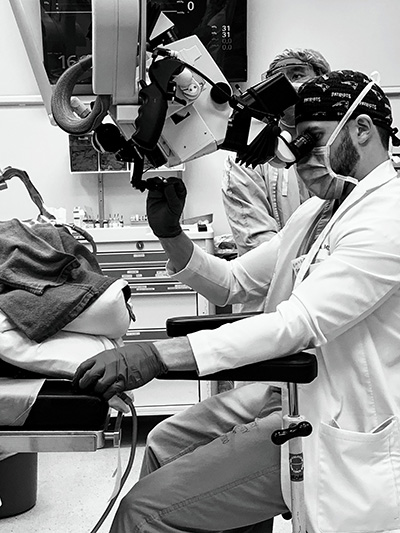Resident Spotlight: Dr. Ryan Instrum, Otolaryngology – Head and Neck Surgery
Otolaryngology – Head and Neck Surgery is a fast-paced and dynamic surgical specialty. For third-year resident Dr. Ryan Instrum, the specialty’s expanding scope of practice makes it an exciting time to be completing his residency training. “As airway surgeons, cases can represent the peak of acuity one day and be outpatient cosmetic facial plastic surgery the next,” he explained.
Dr. Instrum says the structure of the residency program at Schulich Medicine & Dentistry, as well as a supportive and innovative culture, creates a unique training environment. “There is a surplus of surgical opportunity, even as a junior resident.”
 What has been the most rewarding aspect of residency?
What has been the most rewarding aspect of residency?
The totality of my residency experience has been the most rewarding. Entering PGY1, my sense was that junior years were solely for ‘learning the ropes’ — a period to be endured rather than enjoyed. There is a certain element of uncertainty, scut work and pager burden inherent to the position of junior resident, but there is so much more to the experience. The people I have met during the past two years have made my life as a junior resident incredibly gratifying.
Why did you choose the School’s Otolaryngology – Head and Neck Surgery residency program?
The program appealed to me for many of its characteristics: a track record of training excellent surgeons, the infrastructure and resources available for educational and research pursuits, and the world-renowned surgeons within the department. However, what really separated Schulich Medicine & Dentistry from other programs was the structure of the training program and the culture that has been established here. This starts at the top with strong leaders who have truly given the residents a voice in shaping the curriculum. And a culture of positivity with high expectations set by approachable staff creates an environment where I felt I could thrive.
What is the program’s biggest strength?
At Schulich Medicine & Dentistry, all subspecialties are represented and taught by staff with fellowship training from around the world. There is a surplus of surgical opportunity, even as a junior resident. We are also exposed to elements of training that are not available or otherwise not within the domain of otolaryngology at all centres.
The program in London prepares surgeons for top fellowships and community practice alike.
What types of cases and patient populations do you work with?
Otolaryngology – Head and Neck Surgery (OHNS) is a unique speciality insofar as we are one of the few surgical specialties without a medical counterpart, which adds medical flavour to our clinical purview. Surgical diversity within our field is exemplified by the five subspecialties: facial plastic and reconstructive surgery; head and neck oncology; laryngology, otology/neurotology and lateral skull base surgery; rhinology and anterior skull base surgery; and paediatric otolaryngology. These areas encompass the full range of patient populations and surgical scope.
As airway surgeons, cases can represent the peak of acuity one day and be outpatient cosmetic facial plastic surgery the next. The size and complexity of cases is also highly variable and range from stapedotomy using a four-millimetre prosthesis to robotic surgery and mandibulectomy with a fibula free flap reconstruction. OHNS is one of the few specialties whose scope of practice is enlarging rather than shrinking which makes it an exciting field to enter.
What learning opportunities have you pursued as a resident beyond the clinical environment?
As a member of the Department’s Residency Training Committee, I was afforded the opportunity to help shape our program’s curriculum as well as to be involved in Schulich Medicine’s Competency-Based Medical Education (CBME) Program during its implementation across all residency programs.
Opportunities to teach medical students and other junior learners are endless, as are the possibilities when it comes to research.
What do you enjoy most about living in London?
London is a place where residents don’t need to put their broader life goals on hold for another five years. Cost of living is cheap compared to other cities and has allowed many of our residents to buy homes and start families. It is also a beautiful city with so much to do outside. And golf. So much golf.








